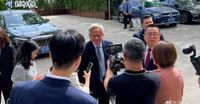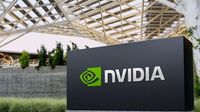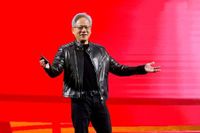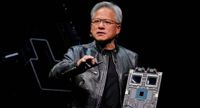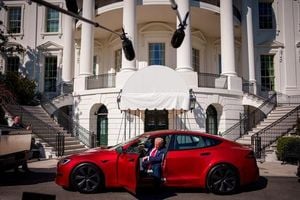Nvidia CEO Jensen Huang has pledged to make every effort to continue serving the Chinese market despite escalating trade tensions between the United States and China. Speaking on April 18, 2025, Huang's commitment comes in the wake of new restrictions announced by President Donald Trump on the export of artificial intelligence (AI) chips to China, a move that could potentially cost Nvidia up to $5.5 billion in revenue.
Huang's statements were made during a visit to Beijing on April 17, where he met with key Chinese officials, including Ren Hongbin, the president of the China Council for the Promotion of International Trade, and reportedly with Vice Premier He Lifeng and Liang Wenfeng, founder of the AI startup DeepSeek. This visit marks Huang's second trip to Beijing in just three months, underlining the significance of the Chinese market for Nvidia.
In his remarks, Huang emphasized the importance of China to Nvidia, stating, "Nvidia will continue to make every effort to optimize its product line in compliance with regulatory requirements and will firmly serve the Chinese market." This statement reflects Nvidia's ongoing strategy to navigate the complexities of international trade while maintaining its presence in a lucrative market.
The backdrop to Huang's visit is a series of sanctions imposed by the U.S. government aimed at restricting the sale of advanced technology to China. These sanctions have particularly targeted Nvidia's H20 AI chip, which was specifically designed for the Chinese market. The company has warned that these restrictions could lead to significant financial losses, prompting Huang to seek ways to adapt to the new regulatory landscape.
Huang's proactive approach during his meetings in Beijing included discussions on how to collaborate with Chinese partners while adhering to U.S. regulations. He noted, "We will continue to collaborate with our Chinese partners and explore ways to comply with regulations without compromising the supply of our products." This sentiment aligns with Nvidia's long-standing commitment to innovation and partnership within the Chinese tech ecosystem.
According to Nvidia's estimates, sales to China account for approximately 20% of the company's total revenue, making the Chinese market a critical component of its business strategy. The company has been operating in China for over 25 years and currently employs more than 4,000 people across various branch offices in major cities such as Beijing, Shanghai, and Shenzhen. Remarkably, Nvidia boasts one of the lowest employee turnover rates in China, at just 0.9% annually.
Huang's visit also highlights the company's deep ties to the Chinese tech industry. He mentioned that Nvidia works with over 1.5 million CUDA developers in China and collaborates with more than 3,000 startups to drive innovation. This extensive network is crucial for Nvidia as it seeks to leverage China's vast talent pool in AI research and development.
Reflecting on the global AI landscape, Huang noted, "Fifty percent of the world’s AI researchers are from China—the largest single group by far, with no close second. So it’s only natural that China will make significant contributions to AI research." He stressed that as AI technology continues to evolve, cooperation between the U.S. and Chinese tech sectors could have a profound impact on the global market structure.
Despite the challenges posed by the current geopolitical climate, Huang remains optimistic about Nvidia's future in China. He reiterated his commitment to maintaining a vibrant industrial ecosystem and cutting-edge software capabilities. In an official statement, a Nvidia spokesperson confirmed that the company regularly meets with government leaders to discuss products and technology, indicating their intention to stay engaged with the Chinese market.
While Huang's efforts to navigate the trade war are commendable, the situation remains fluid. The U.S. government's recent actions have already led to a significant drop in Nvidia's stock price, which fell by 7% on April 16, 2025, following the announcement of the new export restrictions. Investors and analysts alike are closely monitoring the developments, as the outcome of these negotiations could have lasting implications for Nvidia's business operations.
As the trade war continues to unfold, Huang's approach could serve as a model for other tech companies grappling with similar challenges. By prioritizing collaboration and compliance, Nvidia aims to not only safeguard its interests but also contribute to the growth of the Chinese tech industry.
In conclusion, Nvidia's commitment to the Chinese market amid rising tensions with the U.S. highlights the intricate balance tech companies must strike in today's global economy. Huang's proactive measures and emphasis on cooperation may well determine the company's ability to thrive in an increasingly competitive landscape.
